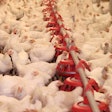
In India, recent outbreaks of highly pathogenic avian influenza (HPAI) have caused disruption to poultry markets. Sales and prices are down, and a poultry market in Delhi has been closed temporarily.
Meanwhile, new cases have been confirmed in poultry flocks in Iran, Japan, and South Korea. In Africa, the Republic of Senegal has registered its first ever HPAI outbreak.
HPAI detected at five duck farms in India
Following recent local media reports of avian flu at several locations, India has officially registered the disease in poultry with the World Organisation for Animal Health (OIE).
According to the animal husbandry ministry, the H5N8 HPAI virus has been detected at five duck farms in the southwestern state of Kerala. Affecting a total of almost 83,000 birds, four of the outbreaks were in the district in Alappuzha, and one in Kottayam. The flocks ranged from around 7,000 to 25,000 birds.
Confirmation of the outbreaks was followed by devastating effects on poultry markets in several areas of India. These were blamed on a widespread fear of the transmission of the virus from meat and eggs to the human population.
Since the start of this year, poultry traders report a 70% fall in sales, according to Business Standard. The Poultry Federation of India say sales were down by as much as 80% within a few days. While chicken meat prices have tumbled by 50%, egg prices have fallen by 15-20%.
In the north of India, the federation reports that there have been outbreaks of avian flu in the state of Haryana. Consequent closing of the borders with neighboring states to prevent the spread of the disease has disrupted the flow of poultry products. This has exacerbated supply problems and price fluctuations.
In an effort to quell fears of bird flu, the Animal Husbandry Commissioner has stated that there is no evidence of the infection being transmitted to people through the consumption of poultry products. He added that sick birds should not be eaten.
Up to last week, this source reported, bird flu had been reported in seven Indian states — mainly in wild birds. Only in Haryana were cases in chickens mentioned.
One week ago, local media referred to outbreaks of avian flu in birds in four states, including in poultry in Kerala. In Rajasthan, Madhya Pradesh, Himachal Pradesh, mass mortalities of wild birds were reported.
Latest report from Times of India puts the number of states/territories in which avian cases have been discovered at 10. This includes Delhi, where the local government has closed a poultry market for 10 days, and halted trade across the regional border. These moves have been criticized by the Union government, which says it creates panic in the population.
Prior to the arrival of HPAI, representatives of India’s poultry industry said the sector had been struggling to recover from the restrictions linked to the coronavirus (COVID-19) pandemic.
No let-up in South Korean outbreaks
As yet, there is no sign of the spread of HPAI being brought under control in South Korea.
Latest report from Yonhap news agency includes a further six suspected outbreaks of the disease. Most recent is at an egg farm at Cheonan, around 90 kilometers from Seoul.
The number of confirmed outbreaks on farms has reached 53. Provinces registering the highest number of outbreaks are Gyeonggi (14 outbreaks), and North Jeolla and South Jeolla (each with 11). Furthermore, the number of wild birds testing positive for the H5N8 HPAI virus is 65. Currently, 14 more cases are suspected among wild species.
According to this source, 15.1 million poultry have been culled in South Korea to prevent the further spread of the disease.
Over the past week, the agriculture ministry has reported to the OIE nine more HPAI outbreaks on farms. Affecting a total of 667,000 poultry, these included six duck flocks, and three of laying hens in six provinces and in Sejong city.
As well as the cases in domestic poultry, the ministry confirmed with the OIE the detection of the same virus variant in a further 11 wild birds at different locations.
According to the OIE reports, HPAI H5N8 was first detected in wild birds in South Korea in late October last year, and among poultry flocks the following month. The country had been free of this virus since March of 2018.
Further outbreak in Japan
This week, an outbreak of HPAI has been confirmed at a poultry farm in Kagoshima prefecture, reports Nippon.com. Around 33,000 poultry are being culled at the Satsuma farm.
Located in the southwest of the country, Kagoshima is the 15th prefecture in Japan to be affected by HPAI this winter. The latest outbreak is the first in the prefecture for more than a decade.
Based on information supplied to the OIE, this brings to 50 the number of HPAI outbreaks in Japan since early October.
More cases in Iran
At the end of December, presence of the H5N8 HPAI virus was confirmed at a commercial poultry farm in the east of the country, according to the Iran Veterinary Organization. According to the OIE report, the farm in South Khorsan had 255,000 poultry, around 1,000 of which died. The rest of the flock has been destroyed.
Earlier in the same month, the virus affected a village turkey flock of around 600 birds in Tehran. Virus-positive cases have also been detected in wild birds in Iran in recent months.
Senegal confirms first ever cases of HPAI
In the West African state, the H5N1 HPAI virus has been detected for the first time.
According to the official report to the OIE, the livestock ministry confirmed that the presence of the virus was identified in a commercial layer flock at Pout in the region of Thiès. Located in the west of the Republic, this region is just to the east of the capital, Dakar.
Of the 100,000 hens on the farm, around 58,000 died, and the remaining birds have been culled. The flock was housed, and the source of the infection is unknown, according to the OIE report.
Following HPAI outbreaks elsewhere in 2005, the Republic of Senegal closed its borders to poultry, reports TV5Monde.
View our continuing coverage of the global avian influenza situation.
















